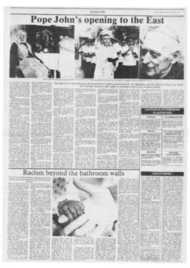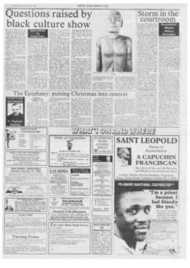Page 8, 5th January 1990
Page 8

Report an error
Noticed an error on this page?If you've noticed an error in this article please click here to report it.
Tags
Share
Related articles
Here's The Answer
Why Not Post Late
Now It's Time To Make Advent Really Mean Something Again
Reflection
Father David Mcgough
The Epiphany: putting Christmas into context
Isaiah 60:1-6 Ephesians 3:2-3, 5-6 Matthew 2:1-18 SO much does Christmas dominate the month of December that the feast of the Epiphany is sometimes in danger of being almost overlooked, yet in the days when the Church graded feast days in order of importance Epiphany ranked above Christmas, and in some countries today it is still seen as the major celebration. Why should this be so?
The first reading helps us with the answer: "above you the Lord now rises, and above you His glory appears", and in the responsorial psalm we reply: "all nations shall fall prostrate before you, 0 Lord".
For the truth is that Christmas is a family celebration, a quiet joyfulness at the birth of the child, a family feast, while Epiphany puts the birth of Christ into its full context. As Paul tells us in the second reading: "it means that pagans now share the same inheritance, that they are parts of the same body, and that the same promise has been made to them".
It is tempting sometimes to try and restrict the incarnation of Christ to the members of one religion or one denomination or even one little sect and cry damnation upon the rest of the world. Today's feast reminds us that when Christ took on human flesh He transformed the whole of humanity, not just those who believed in Him. The magi, the wise men, represent all those who seek for the truth, all those who follow their own consciences with fidelity and integrity, all who search for what is right and good and true.
The scriptures remind us that when Jesus died on His cross He took upon Himself the sins of all men and women: all are forgiven, although not all may accept that forgiveness.
The gospel tells us that the wise men brought gifts, "of gold and frankincense and myrrh". Gold was the gift for a king, for Christ came to build a kingdom, a kingdom of "justice, love and peace". Frankincense was the gift for a priest, the sweet incense of sacrifice, for the priest offers sacrifice, makes holy what he offers, as Christ's redemption makes holy the people He offers to His Father. Myrrh was the gift for one who was to die. Christ's kingdom was to be founded on a cross, His journey to God was a journey of suffering and selfgiving and death.
So today's feast is also the feast of every christian, chosen through baptism to share in the life, death and resurrection of Christ, chosen therefore to be the body of Chi ist in the world, to bear witness to His kingdom by a life characterised by a search for truth and justice, a struggle to grow in generosity and love, a readiness to seek reconciliation and forgiveness.
"You are a chosen race, a royal priesthood, a consecrated nation, a people set apart to sing the praises of God who called you out of the darkness into His wonderful light" (1 Peter). Yes, he is talking about you and me.
blog comments powered by Disqus











